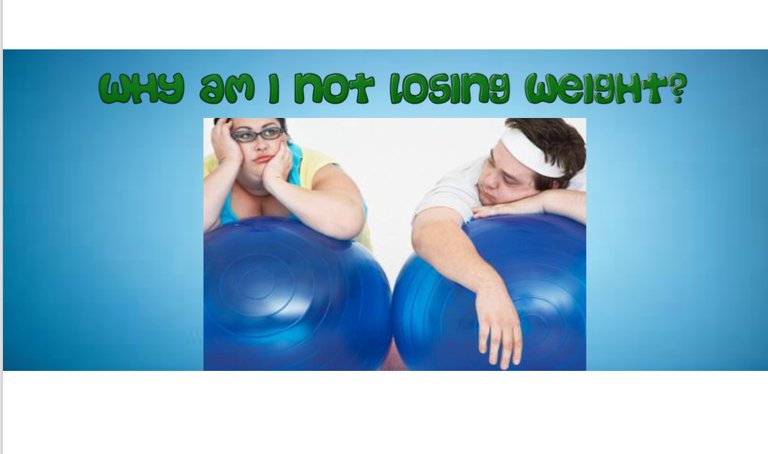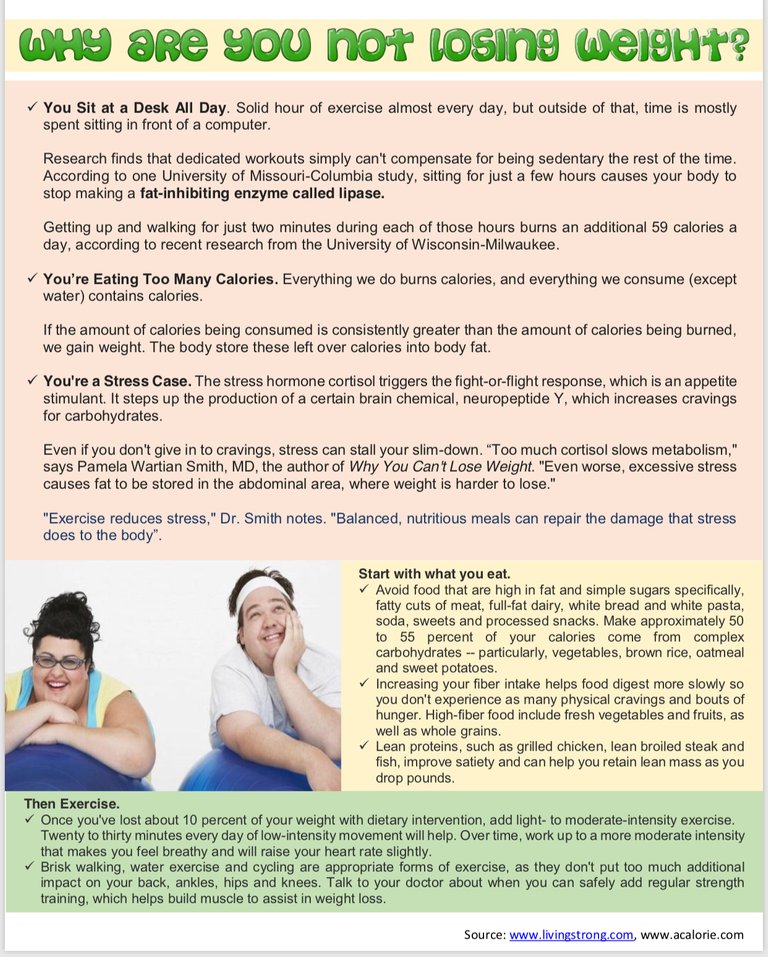

You Sit at a Desk All Day. Solid hour of exercise almost every day, but outside of that, time is mostly spent sitting in front of a computer.
Research finds that dedicated workouts simply can't compensate for being sedentary the rest of the time. According to one University of Missouri-Columbia study, sitting for just a few hours causes your body to stop making a fat-inhibiting enzyme called lipase.
Getting up and walking for just two minutes during each of those hours burns an additional 59 calories a day, according to recent research from the University of Wisconsin-Milwaukee.
You’re Eating Too Many Calories. Everything we do burns calories, and everything we consume (except water) contains calories.
If the amount of calories being consumed is consistently greater than the amount of calories being burned, we gain weight. The body store these left over calories into body fat.
You're a Stress Case. The stress hormone cortisol triggers the fight-or-flight response, which is an appetite stimulant. It steps up the production of a certain brain chemical, neuropeptide Y, which increases cravings for carbohydrates.
"Exercise reduces stress," Dr. Smith notes. "Balanced, nutritious meals can repair the damage that stress does to the body”.
What can you do:
Even if you don't give in to cravings, stress can stall your slim-down. “Too much cortisol slows metabolism," says Pamela Wartian Smith, MD, the author of Why You Can't Lose Weight. "Even worse, excessive stress causes fat to be stored in the abdominal area, where weight is harder to lose."
Start with what you eat.
Avoid food that are high in fat and simple sugars specifically, fatty cuts of meat, full-fat dairy, white bread and white pasta, soda, sweets and processed snacks. Make approximately 50 to 55 percent of your calories come from complex carbohydrates -- particularly, vegetables, brown rice, oatmeal and sweet potatoes.
Increasing your fiber intake helps food digest more slowly so you don't experience as many physical cravings and bouts of hunger. High-fiber food include fresh vegetables and fruits, as well as whole grains.
Lean proteins, such as grilled chicken, lean broiled steak and fish, improve satiety and can help you retain lean mass as you drop pounds.
Then Exercise.
Once you've lost about 10 percent of your weight with dietary intervention, add light- to moderate-intensity exercise. Twenty to thirty minutes every day of low-intensity movement will help. Over time, work up to a more moderate intensity that makes you feel breathy and will raise your heart rate slightly.
Brisk walking, water exercise and cycling are appropriate forms of exercise, as they don't put too much additional impact on your back, ankles, hips and knees. Talk to your doctor about when you can safely add regular strength training, which helps build muscle to assist in weight loss.
Source: www.livingstrong.com, www.acalorie.com
more and more drinking water and more and more eating vegetable and
exercise,
too busy from work... cant afford to do some exercise...
Congratulations @appledeguzman! You have completed the following achievement on Steemit and have been rewarded with new badge(s) :
Click on the badge to view your Board of Honor.
If you no longer want to receive notifications, reply to this comment with the word
STOPTo support your work, I also upvoted your post!
Do not miss the last post from @steemitboard:
SteemitBoard World Cup Contest - The results, the winners and the prizes